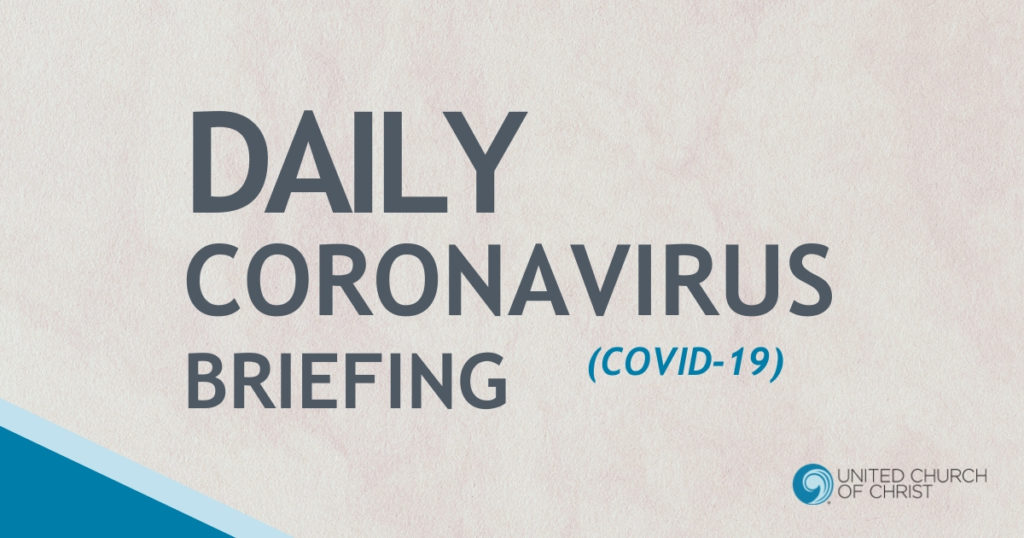Contact Tracing and the TRACE Act H.R. 6666
United Church of Christ – Wider Church Ministries
Humanitarian Development Team
Coronavirus (COVID-19) Daily Briefing
Barbara T. Baylor, MPH – Temporary Health Liaison
Contact Testing and the TRACE Act H.R. 6666
Editor’s Note: Urgent advocacy opportunity included!
Around the first week of May, a claim concerning House of Representatives bill H.R. 6666 circulated through web articles and various social media asserting that:
This claim is FALSE!
H.R. 6666 is proactive response to COVID-19, the novel coronavirus that continues to prey upon our country day by day. New infections and deaths continue to skyrocket amid cries to “reopen our states and cities.”
Now, I realize that, for some, the number 666 carries an ominous association with the devil, the antichrist or “the beast.” The truth is, H.R. 6666 got assigned its number completely by chance. Bills from each house are numbered in the order in which they are introduced.
So don’t let the bill number dissuade you from supporting H.R. 6666, introduced May 1 by U.S. Rep. Bobby Rush (D-1). Let’s read it, and look at what the bill does and does not do.
What the Bill Does
The bill funds mobile health units and outreach testing. It would provide $100 billion in grants to faith-based organizations, clinics, medical centers, institutions of higher education, high schools and other organizations that test for COVID-19 and conduct related activities such as contact tracing – as necessary, at individuals’ residences. The funding would also be available to pay for staff or purchase personal protective equipment to protect staff.
The Bill Does NOT …
- Make testing or quarantining mandatory. The bill includes privacy protections for the medical information of individuals that would limit how grantee organizations could share information collected with the federal government.
- Call for the removal of children of adults from homes under any circumstances.
Authorize anyone to forcibly enter homes to test residents for COVID-19. - Require participating entities to “only allow people into their facilities that have the COVID-19 vaccination” (There is currently no vaccine to prevent COVID-19.).
More About Contact Tracing
Contact tracing – one of the services covered in the bill – is a core disease control measure employed by local and state public health departments for decades to rapidly detect new cases of disease and prevent further transmission. It is NOT NEW. It has been used to fight the spread of Smallpox, Ebola, sexually transmitted infections including HIV/AIDS and syphilis, to name a few.
And it is a key strategy for preventing further spread of COVID-19.
Contact tracing:
- Is part of the process of supporting peoples with suspected or confirmed infection.
- Is public health staff working with peoples to help them recall everyone with whom they have had close contact during the time frame while they may have been infectious and providing advice and information on their potential exposure as rapidly and sensitively as possible.
- Protects participants’ privacy. Contacts are only informed that they may have been exposed to a person with the infection. They are not told the identity of the person who may have exposed them.
Immediate action is needed. Communities must scale up and train a large contact tracer workforce and work collaboratively across public and private agencies to stop the transmission of COVID-19.
A late-April NPR survey of all 50 states, Puerto Rico and the District of Columbia showed that states had, or planned to have, around 36,000 workers in total focused on contact tracing. Since then states have expand that number to 66,197 workers — an increase by 30,000 of the number that were planned when the survey was first published.
CDC Director Robert Redfield has said contact tracing will be a key factor in reopening the United States after the COVID-19 pandemic. He and other public health leaders widely agree that communities need to ramp up their capacity to test, trace and isolate, in order to safely ease up on social distancing measures and allow people to get back to work.
While contact tracing is a labor-intensive, time-consuming practice, it is important that we not only ramp up testing but do very aggressive contact tracing on those who do test positive for COVID-19.
Actions Needed
1. Please help dispel rumors and misinformation about H.R. 6666 by reading the bill in its entirety and then speaking the truth about this much-needed legislation. The bill currently sits in the House Committee on Energy and Commerce. Please contact the following chairs of that committee and ask them to co-sponsor this legislation and allow the bill to move past the Committee stage:
Chair – Rep. Frank Pallone [D-NJ6]
Vice Chair – Rep. Yvette Clarke [D-NY9]
Ranking Member – Rep. Greg Walden [R-OR2]
2. Please contact your Representative and ask them to co-sponsor this bill.
References:
H.R.6666 – COVID-19 Testing, Reaching, And Contacting Everyone (TRACE) Act
Snopes: Does H.R. 6666 require people to be vaccinated for COVID-19?
CDC: Contact Tracing – Part of a Multipronged Approach to Fight the COVID-19 Pandemic
CDC Director: Very Aggressive Contact Tracing Needed for U.S. to Return to Normal
Contact Tracing Performance During the Ebola Epidemic in Liberia 2014-15
What’s Contact Tracing? It’s Key to Reopening U.S. After COVID-19 Pandemic, Experts Say
How State Disease Detectives Track and Prevent Spread of STDs
Syphilis Outbreak Response in Southwest Oklahoma
How The Painstaking Work Of Contact Tracing Can Slow The Spread Of An Outbreak
Related News
Bodily Autonomy Means Every-BODY
Advocacy and Action for Women's and Gender Justice Local events stir thoughts and...
Read MoreAn ally experiences PRIDE in the CLE
Advocacy and Action for Women's and Gender Justice Local events stir thoughts and...
Read MoreUCC Releases Menstrual Health Toolkit
Advocacy and Action for Menstrual Health and Justice Work with partners Church World Service...
Read More
